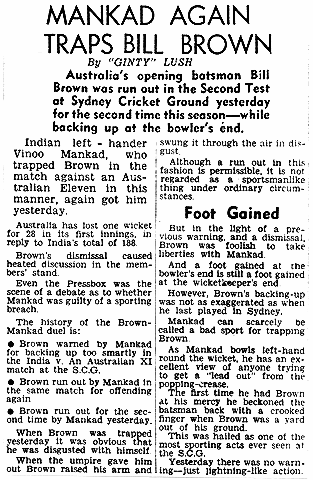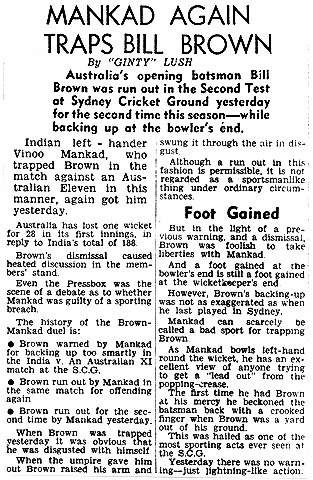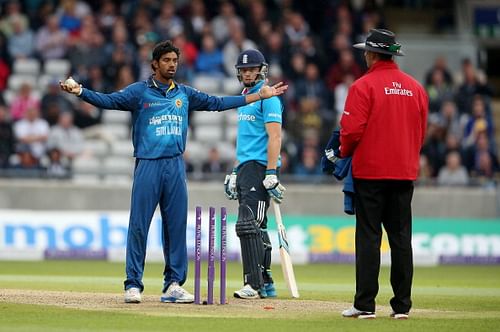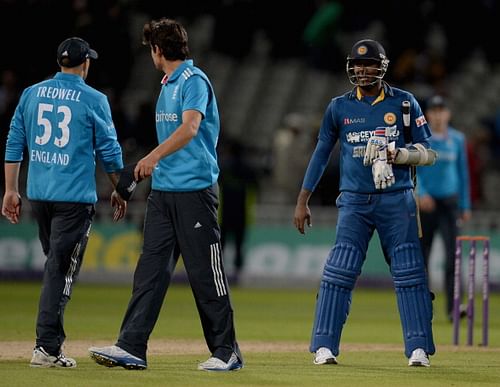
'Mankading' and the Jos Buttler Incident
In light of the recent One Day International series between Sri Lanka and England, the issue of 'Mankading', or running the non-striker out before the ball is bowled, has come up again. With this unusual mode of dismissal, a debate over the spirit of the game was bound to come up. This leads to differences in opinion regarding the interpretation of the MCC’s 'Spirit of Cricket', a preamble to the 'Laws of Cricket', and often risks bad blood between the two teams.
What is ‘Mankading’?

‘Mankading’ is a term given to the process of running out a non-striking batsman before a ball has been bowled.
The law for such run-outs is as follows: "The bowler is permitted, before releasing the ball and provided he has not completed his usual delivery swing, to attempt to run out the non-striker. Whether the attempt is successful or not, the ball shall not count as one of the over. If the bowler fails in an attempt to run out the non-striker, the umpire shall call and signal dead ball as soon as possible."
This mode of dismissal got its name from the Indian cricketer Vinoo Mankad, who was the first player to dismiss a batsman in this way, at Sydney, Australia, in 1947-48.
The Jos Buttler Incident

This particular incident occurred in the 5th ODI, at Edgbaston, with England and Sri Lanka tied at 2-2 in the 5-match series. Having spotted Jos Buttler taking a pace or two out of his crease at the non striker's end prior to the ball being bowled, Sri Lankan bowler Sachithra Senanayake brought it to the attention of the umpire, as it gave the batsman a slight advantage in completing a run.
The batsman was subsequently warned that he must stay in his crease until the ball was bowled. The same thing happened again, only this time Senanayake stopped in his delivery stride and dislodged the bails, with Buttler a couple of steps outside his crease. With the Sri Lankans claiming the dismissal, the on-field umpire Michael Gough was left with no option but to rule the batsman 'out'. Sri Lanka would go on to win the match, and the series.
The Reaction

This incident, as expected, caused quite a stir in the cricketing community, with opinions divided on the issue. The English players and media were fuming. Former players, commentators, spectators, all had their say. Alastair Cook and a couple of the other Englishmen let opposition captain Angelo Mathews know exactly how they felt.
Former England captain Michael Vaughan was particularly vocal about his dissatisfaction. When asked about his team's appeal, Mathews stood by his decision, claiming the batsman had been given two warnings prior to the dismissal.
The Spirit of Cricket
The MCC’s Spirit of Cricket is a preamble to the Laws of Cricket. It is meant to be a guideline that ensures that the game is contested in a sportsmanlike manner. This is something that can often be interpreted in several ways, leading to debate in issues like this particular one.
With this incident, several questioned whether the Sri Lankans had upheld the Spirit of Cricket. Some critics claimed that it came about as a result of Senanayake's frustration with the issue of his bowling action, which had come up earlier in the series. Sri Lanka claim that, in the previous game, Buttler had done the same thing, enabling him to complete 2 runs on 21 occasions. However, to decide whether this was in the spirit of the game, we must take into account a few things.
The common consensus is that Mankading is against the spirit of the game. However, in this instance, it must also be noted that Sri Lanka had warned the batsman previously in the innings. This meant that Buttler was aware that the Sri Lankans were prepared to run him out on the next occasion.
According to former England cricketer Mark Butcher, the Sri Lankans had every right to affect this dismissal, and it was Buttler's responsibility to make sure that he was in his crease until the ball was bowled. According to him, Buttler had no one to blame but himself. He was of the opinion that there was no question of spirit of the game, since the warning was given.
With the Sri Lankans coming under scrutiny, the question could be asked if the English themselves were upholding the spirit of the game, by gaining a slight advantage of a few steps. In close run outs and quick singles, even a couple of paces can make the difference. It can be argued that gaining this advantage, too, is not in the spirit of the game.
Had there been no prior warning, there may have been more unanimity in opinion, but, given the warning, there is the opinion that there was no breach in the spirit.
Right or Wrong?
Given all these facts, opinion is still divided. This is not the first time it has happened, and one suspects it won't be the last time the Spirit of Cricket comes into question. It is not the kind of dismissal one likes to see, but it is something that is bound to happen with the high levels of competition, just as batsmen try to gain every possible advantage.
Both, some may say, are questionable; though it is likely that when talking of the spirit of the game, the bowler affecting the dismissal is more under scrutiny than the batsman, if he is at all.